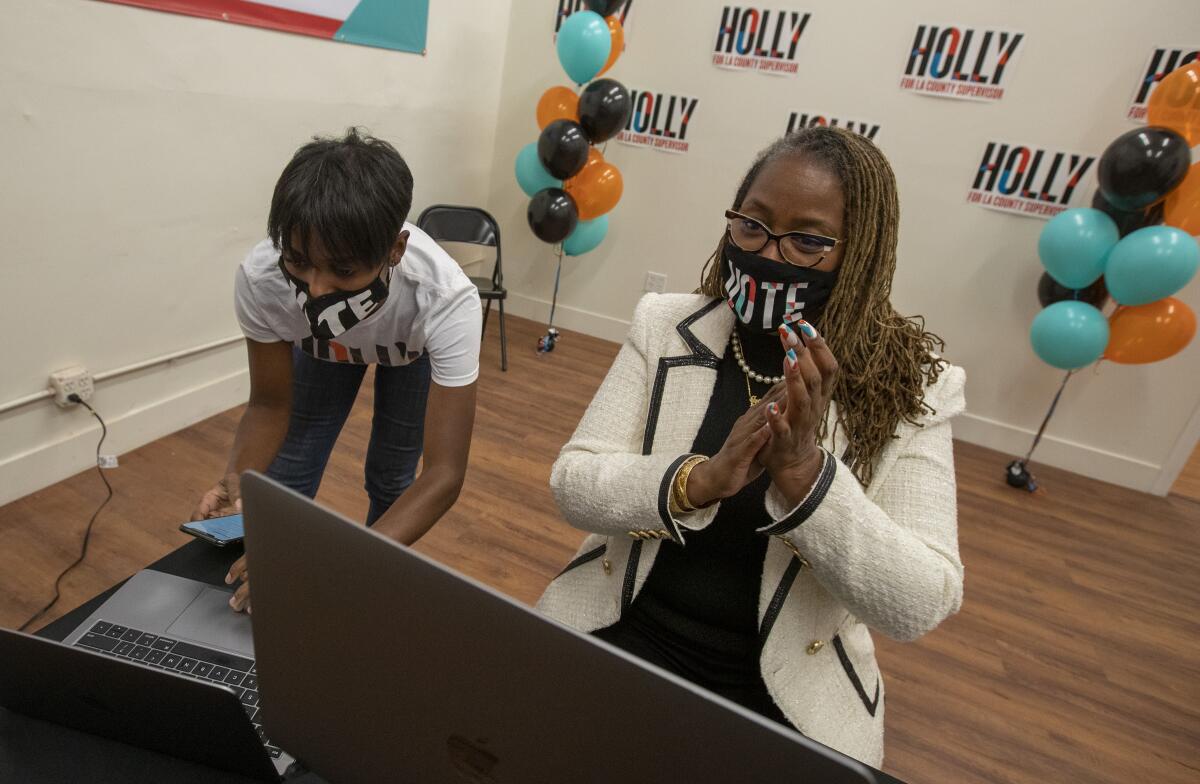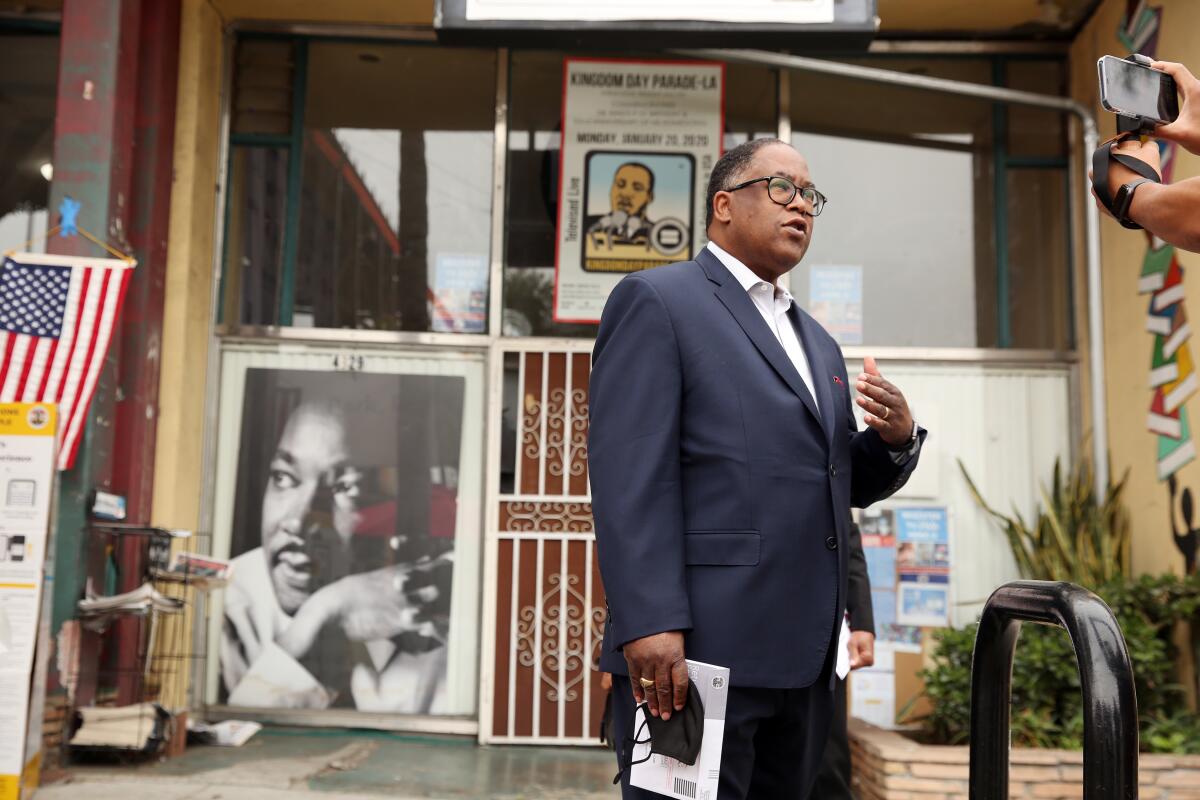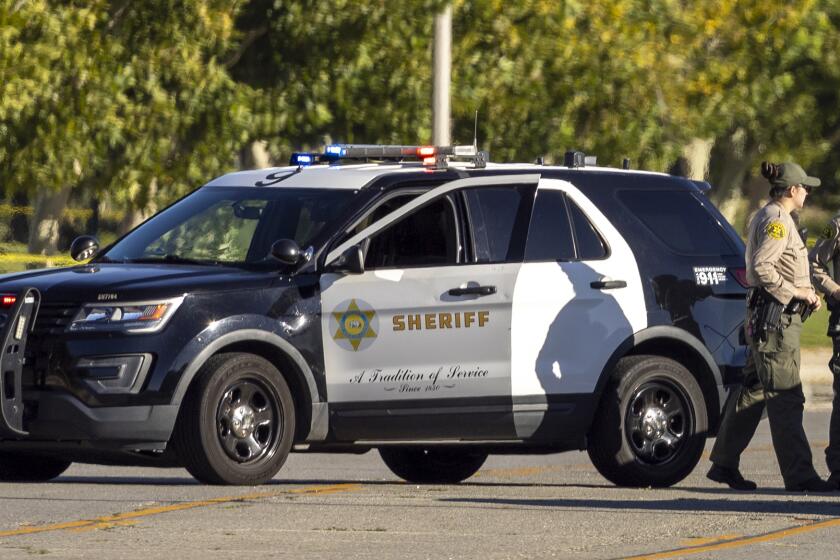Newsletter: Essential California: The common threads in three L.A. races

- Share via
Good morning, and welcome to the Essential California newsletter. It’s Thursday, Nov. 5, and I’m writing from Los Angeles.
Sign up for Essential California
The most important California stories and recommendations in your inbox every morning.
You may occasionally receive promotional content from the Los Angeles Times.
The fate of the presidency still hangs in the balance, as President Trump and Joe Biden duel over battleground states. The margin between Trump and Biden has continued to narrow in Georgia as final votes are tallied in Democratic-leaning areas. The president’s extraordinary attack on the voting system continued Wednesday with a broad legal assault on ballot counting across a handful of toss-up states that will decide the presidential election.
[See also: “Legal experts cast doubt on Trump’s bid to involve Supreme Court in election results” in the Los Angeles Times]
In short, Americans — who turned out to vote in this year’s election as never before — are probably in for another day of nail-biting and waiting.
With little definitive news to report in the presidential race, we’ll focus this morning on three L.A. races that have drawn considerable attention as bellwethers of a leftward shift in local politics.
On Wednesday, state Sen. Holly Mitchell defeated former City Council President and current City Councilman Herb Wesson to win a seat on the Los Angeles County Board of Supervisors. With Mitchell’s victory, the powerful governing body once known as the “five little kings” will soon be entirely female. (Quite a feat, especially considering that only men served on the board for 127 years.)
[See also: “L.A. County will have an all-female Board of Supervisors for the first time” in the Los Angeles Times]
Meanwhile, as of Wednesday night, former San Francisco Dist. Atty. George Gascón held a steady lead over incumbent Los Angeles County Dist. Atty. Jackie Lacey in the race to lead the nation’s largest local prosecutor’s office, and urban planner Nithya Raman remained in a strong position to unseat Councilman David Ryu, which would make him the first L.A. council member to be ousted in 17 years. (To be clear, votes in both of those races are still being counted, and neither candidate has yet declared victory.)
[See also: “From George Gascón to jail diversion, criminal justice reform got a big boost in California” in the Los Angeles Times]
What do Mitchell, Raman and Gascón have in common? For one, all three were endorsed by Sen. Bernie Sanders. And in a true rarity for L.A. political races, both the Gascón and Raman campaigns were under the national spotlight, with the district attorney race framed as a referendum on criminal justice reform. Hillary Clinton also weighed in on the Raman-Ryu City Council race, endorsing Ryu.
Raphael J. Sonenshein, a local government expert who runs the Edmund G. “Pat” Brown Institute of Public Affairs at Cal State L.A., characterized Sanders’ and Clinton’s endorsements in the race as “a testimony to the growing significance of L.A. politics in national Democratic politics.”
As my colleagues report, activists pointed to all three races on Wednesday and said L.A.’s political leaders can no longer dismiss those fighting the status quo on homelessness, public safety and other issues. Progressive dreams of a national “blue wave” may have been dashed on Tuesday, but it was a heck of a day for local progressive candidates.
Sonenshein attributed the success of L.A. progressives to several factors, including the sheer number of people drawn to the polls by the presidential election. He also saw the death of George Floyd in the custody of Minnesota police as a pivotal part of L.A.’s progressive wave at the ballot box.
“It really took something that had been an intense debate and turned it into a movement,” Sonenshein said, explaining that the protests for racial equity had energized voters and fundamentally changed the landscape in the months after the March primary.
[See also: “Angry voters, higher turnout, Hollywood money: How Nithya Raman gained an edge in L.A.” in the Los Angeles Times]
Still, Los Angeles has a long history of not caring about local politics. In the past, a certain class of L.A. liberal might donate to half a dozen House candidates across the country but not be able to name their own City Council person. But local races galvanized Angelenos in 2020. So, does all this mean Angelenos are finally starting to care about politics in their own backyard?
“I don’t know yet,” Sonenshein said. “I think what you’ve got is a different electorate.”
Let’s rewind quickly to 2015, when an outsider named David Ryu was challenging the status quo and promising to shake things up at City Hall. The March primary that year made headlines as a low point in the city’s decades-long slide in voter turnout, with just 16.4% of registered voters in the district casting ballots.
Local L.A. elections had long been held in odd-numbered years. But during that same March 2015 election, voters approved amendments to the city charter that would move local elections to even-numbered years to coincide with gubernatorial and presidential elections. These changes went into effect in 2020.
As opinion writer Kerry Cavanaugh reports, the first test of that new voting schedule — the March 2020 primary, which also coincided with California’s newly relevant spot on the Super Tuesday roster — saw a big increase in participation. In some city council races, the number of votes cast tripled or quadrupled compared with the previous election.
[See also: “Opinion: Donald Trump has been good for one thing at least: L.A. election voter turnout” in the Los Angeles Times]
“Even before all the things happened in May and June and July to make everything more intense, the even-numbered thing was already creating this gigantic turnout model,” Sonenshein explained.
That surge in turnout didn’t just affect the number of people casting ballots, it also marked a fundamental shift in their demographics. According to Sonenshein, the electorate in local L.A. races has typically skewed toward older homeowners, and generally been pretty white. But when the local election moves to an even-numbered year, that group “gets changed to a more diverse electorate that we’re used to in presidential and statewide elections, which is more renters, more communities of color, younger voters.”
“It’s not the same election,” Sonenshein said, noting that he hadn’t seen such a dramatic change in the local electorate since the early 1990s, when the passage of Proposition 187 mobilized a massive increase in working-class Latino voters.
And now, here’s what’s happening across California:
Republicans may take back two congressional seats in key Orange County races: In a rare bright spot for California’s beleaguered GOP, two Republican challengers are within striking distance of unseating two Orange County Democrats who were elected to Congress during the 2018 blue wave. As of Wednesday, county Supervisor Michelle Steel was clinging to a slender lead over Rep. Harley Rouda, and former state Assemblywoman Young Kim was leading Rep. Gil Cisneros. Los Angeles Times
California’s COVID-19 efforts fare better than the national average, but hospitalizations are rising: The statewide number of hospitalizations increased by 13.5% over the last 14 days, and the number of patients in intensive care has grown by nearly 20%. Los Angeles Times
Note: Some of the sites we link to may limit the number of stories you can access without subscribing.
L.A. STORIES
Well, one thing is certain: Kanye West will not be elected president. Los Angeles Times
Los Angeles County Supervisor Mark Ridley-Thomas declared victory over attorney Grace Yoo in his race to represent a Koreatown-to-Crenshaw district on the Los Angeles City Council, setting the stage for a return to City Hall after an 18-year absence. Los Angeles Times

Two groups of activists converged in downtown L.A. on Wednesday night: One group gathered to celebrate the seeming defeat of incumbent Dist. Atty. Jackie Lacey, against whom they’ve long rallied; and the other to protest the erroneous claim by Donald Trump that he had already won the presidential election. LAist
Support our journalism
POLITICS AND GOVERNMENT
Republicans brushed back challengers in some of the most competitive U.S. Senate contests, bolstering the party’s hopes of retaining control of the chamber and erecting a powerful firewall against a potential Joe Biden administration. Los Angeles Times
Top takeaways — and surprises — from high-profile races in Sacramento and Northern California. Voters reelected a slew of incumbents but left a couple of nationally prominent mayors — including Stockton Mayor Michael Tubbs — fighting for their political lives. Tubbs was trailing his opponent. Sacramento Bee
Rep. Devin Nunes has won reelection to Congress. In a surprise to many, the Central Valley Republican briefly appeared to be at risk of losing his seat during the early vote tallies Tuesday night. But he emerged victorious, besting Democratic challenger Phil Arballo. Los Angeles Times
Here’s a proposition-by-proposition rundown of where things stand for the state ballot measures:
- Proposition 14, the stem cell research bond, is still leading, but results had yet to be called as of Wednesday night. Los Angeles Times
- Proposition 15, which would loosen California’s business property tax rules, is trailing. The ballot measure — an effort to remove high-value business properties from the low-tax protections enacted by California voters more than four decades ago — had yet to be called. Los Angeles Times
- Proposition 16, which would have allowed affirmative action policies in California, was rejected. The proposition was placed on the ballot by the Democrat-controlled California Legislature to repeal Proposition 209, a highly controversial measure approved by voters in 1996 that barred affirmative action programs in the state. Los Angeles Times
- Proposition 17, which will let parolees vote in California, was approved. The measure restores the vote to some 50,000 parolees by changing the state Constitution, which disqualifies people with felony convictions from voting until their incarceration and parole are completed. Los Angeles Times
- Proposition 18, which would allow some 17-year-olds to vote, is trailing but had also yet to be called. Los Angeles Times
- Proposition 19, which gives new property tax breaks to older homeowners, holds a lead. The California Assn. of Realtors was the driving force behind the proposition, with real estate interests raising more than $39 million for its passage. Los Angeles Times
- Proposition 20, which would have toughened sentencing in criminal cases, was rejected. Former Gov. Jerry Brown, who played a key role in some changes that would be rolled back by Proposition 20, campaigned against the measure and criticized its supporters, calling the measure “vindictive.” Los Angeles Times
- Proposition 21, a bid to expand rent control statewide, was rejected. A statewide ban on most new forms of rent control will remain in effect. Los Angeles Times
- Proposition 22, Uber and Lyft’s $200-million campaign to keep drivers as independent contractors, was successful. The measure’s passage — which grants ride-hail and delivery companies an exemption from California employment law — also deals a blow to California’s powerful labor unions. The fight over Proposition 22 was one of the most closely watched ballot measure contests in the country and the costliest in state history. Los Angeles Times
- Proposition 23, which would have imposed new regulations on the dialysis industry, failed. The proposition would have required dialysis clinics to employ at least one doctor who would be on site whenever patients are receiving treatment. Los Angeles Times
- Proposition 24 was approved, ushering in new rules for online privacy. The changes will go into effect in 2023. Los Angeles Times
- Proposition 25, which would have abolished California’s cash bail system, was rejected. The ballot measure was heavily opposed by the bail industry and sheriff’s associations, but it was by no means uniformly supported by critics of the money bail system. A coalition of prominent social justice groups campaigned against it, with the ACLU warning that Proposition 25 would replace money bail “with risk assessment tools that are racially and socioeconomically biased.” Los Angeles Times
[See also: “California’s highest court could still curtail cash bail, upheld by the state’s voters” in the Los Angeles Times]
HEALTH AND THE ENVIRONMENT
The U.S. has formally pulled out of the Paris climate accord. The move, long promised by President Trump and put in motion by his administration a year ago, further isolates the U.S. but has no immediate effect on international efforts to curb global warming. Associated Press
CALIFORNIA CULTURE
The Gap posted a video of a half-red, half-blue hoodie on social media with the caption, “The one thing we know, is that together, we can move forward.” And yes, backlash ensued. “It was just too soon for this message,” a Gap spokeswoman said in an email. San Francisco Chronicle
The NBA and players are trying to finalize a Dec. 22 start for the new season: The NBA’s owners will hold a meeting Thursday while players continue discussions on what’s rapidly considered an inevitability — a Dec. 22 start to next season. Los Angeles Times
A poem to start your Thursday: “In a Country” by Larry Levis. Poets.org
Free online games
Get our free daily crossword puzzle, sudoku, word search and arcade games in our new game center at latimes.com/games.
CALIFORNIA ALMANAC
Los Angeles: cloudy, 91. San Diego: partly sunny, 82. San Francisco: partly sunny, 66. San Jose: sunny, 77. Fresno: sunny, 81. Sacramento: sunny, 81. More weather is here.
AND FINALLY
Today’s California memory comes from Diane Brunson:
Our Newport Beach vacation home was small and old, even by 1950s standards. A lifeguard perched on his tower in front of our house. The ball and rope attached to a pole haphazardly stuck in the sand provided us with tetherball. On the nearly empty beach, we played cards, napped and swam. Waves pushed us to shore on rubber air-mattresses later replaced by boogie boards. Skim boards slid us across damp sand. Volleyball occupied part of the day. Swiveling hula hoops around waists, kids walked the beach to a train trestle where the Santa Ana River entered the ocean.
If you have a memory or story about the Golden State, share it with us. (Please keep your story to 100 words.)
Please let us know what we can do to make this newsletter more useful to you. Send comments, complaints, ideas and unrelated book recommendations to Julia Wick. Follow her on Twitter @Sherlyholmes.
Sign up for Essential California
The most important California stories and recommendations in your inbox every morning.
You may occasionally receive promotional content from the Los Angeles Times.







